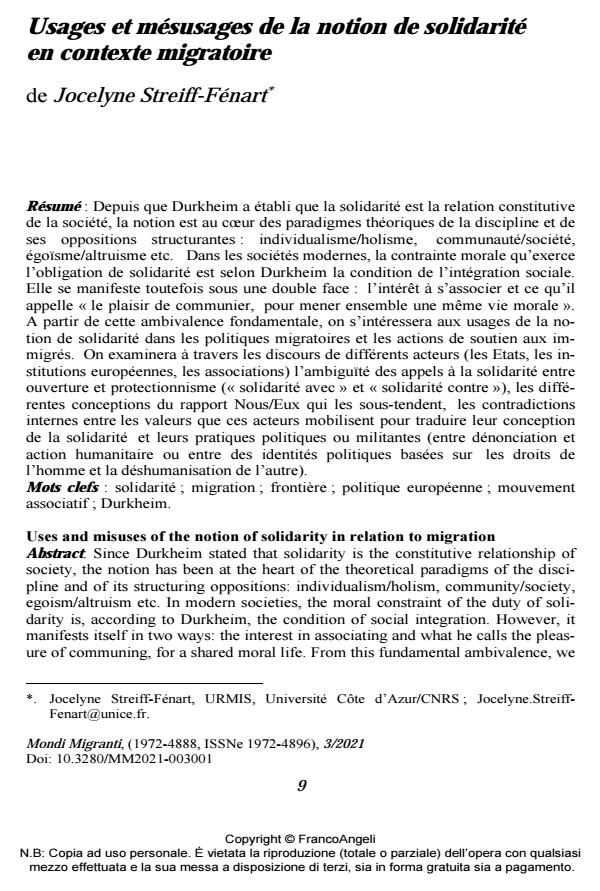Uses and misuses of the notion of solidarity in relation to migration
Journal title MONDI MIGRANTI
Author/s Jocelyne Streiff-Fénart
Publishing Year 2021 Issue 2021/3
Language French Pages 13 P. 9-21 File size 169 KB
DOI 10.3280/MM2021-003001
DOI is like a bar code for intellectual property: to have more infomation
click here
Below, you can see the article first page
If you want to buy this article in PDF format, you can do it, following the instructions to buy download credits

FrancoAngeli is member of Publishers International Linking Association, Inc (PILA), a not-for-profit association which run the CrossRef service enabling links to and from online scholarly content.
Since Durkheim stated that solidarity is the constitutive relationship of society, the notion has been at the heart of the theoretical paradigms of the discipline and of its structuring oppositions: individualism/holism, community/society, egoism/altruism etc. In modern societies, the moral constraint of the duty of solidarity is, according to Durkheim, the condition of social integration. However, it manifests itself in two ways: the interest in associating and what he calls the pleasure of communing, for a shared moral life. From this fundamental ambivalence, we will focus on the uses of the notion of solidarity in migration policies and actions in support of immigrants. Through the discourses of different actors (States, European institutions, volunteer associations), we will examine the ambiguity of calls for solidarity between openness and protectionism ("solidarity with" and "solidarity against"), the different conceptions of the Us/Them relationship that underlie them, the internal contradictions between the values that these actors mobilize to translate their conception of solidarity and their political or militant practices (between denunciation and humanitarian action or between political identities based on human rights and the dehumanization of the other).
Keywords: solidarity; migration; border; EU policy; NGO; Durkheim
- Cuttita P. (2018). Repoliticization through Search and Rescue? Geopolitics, 23 : 632-660.
- Deleixhe M. (2014). Une réévaluation du droit cosmopolitique kantien. Revue française de science politique, 1, 64 : 79-93.
- Agarin T. et Nancheva N., éds. (2018). A European Crisis : Perspectives on Refugees, Solidarity and Europe. Berlin : ibídem Press.
- Agier M. (2018). L’étranger qui vient. Repenser l’hospitalité. Paris: Seuil.
- Bigot D. (2008). Le “phagocytage” des questions de migration et de libre circulation en Europe par les enjeux de sécurité. Migrations sociétés, 2, 116 : 73-94.
- Chauvier S. (1996). Du droit d’être étranger. Essai sur le concept kantien d’un droit cosmopolitique. Paris : L’Harmattan.
- Durkheim E. (1950). Leçons de sociologie. Physique des mœurs et du Droit. Paris : PUF.
- Durkheim E. ([1893] 1986). De la division du travail social. Paris : PUF, Quadrige.
- Kant E. ([1795] 2007). Vers la paix perpétuelle. Paris : J. Vrin.
- Geiger M. and Pécoud A., éds. (2010). The Politics of International Migration Management. Basingstoke: Palgrave Macmillan.
- Gotman A. (2007). Sous la solidarité et le droit : l’hospitalité. In : Paugam S., éds., Repenser la solidarité. Paris: PUF.
- Gotman A. (2001). Le sens de l’hospitalité. Paris: PUF.
- Guiraudon V. (2008). Une lutte contre les « passeurs » qui se retourne contre les victimes. In: Rodier C. et Terray E., éds., Immigration : fantasmes et réalité - Pour une alternative à la fermeture des frontières. Paris : La Découverte.
- Lacroix T. (2020). Réseaux des villes hospitalières: un panorama global. E-Migrinter, Université́ de Poitiers ; DOI: 10.4000/e-migrinter.2281
- ObsMigAM (2020). Le manège des frontières. Paris: Le passager clandestin.
- Renan E. (1997). Qu’est-ce qu’une Nation ? Paris: Ed. Mille et une nuits.
- Rodriguez N. (1996). The Battle for the Border : Notes on Autonomous Migrations, Transnational Communities and the State. Social Justice, 23, 3, 65: 21-37.
- Sayad A. (1999). Immigration et « pensée d’Etat ». Actes de la Recherche en Science Sociales, 129 : 5-14.
- Slama S. (2020). Dispositifs d’hébergement : la grande centrifugeuse étatique des demandeurs d’asile. Revue Européenne des Migrations Internationales, 2/3, 36/2: 255-267 ; DOI: 10.4000/remi.15906
- Streiff-Fénart J. (2018). Pour en finir avec la moralisation de la question migratoire. Mouvements, 1, 93 : 13-21.
- Vaughan-William N. (2015). Europ’s Borders Crisis: Biopolitical Security and Beyond. Oxford: Oxford University Press.
Jocelyne Streiff-Fénart, Usages et mésusages de la notion de solidarité en contexte migratoire in "MONDI MIGRANTI" 3/2021, pp 9-21, DOI: 10.3280/MM2021-003001